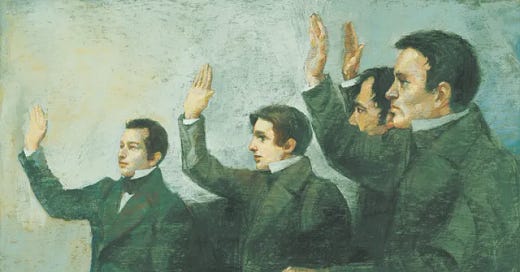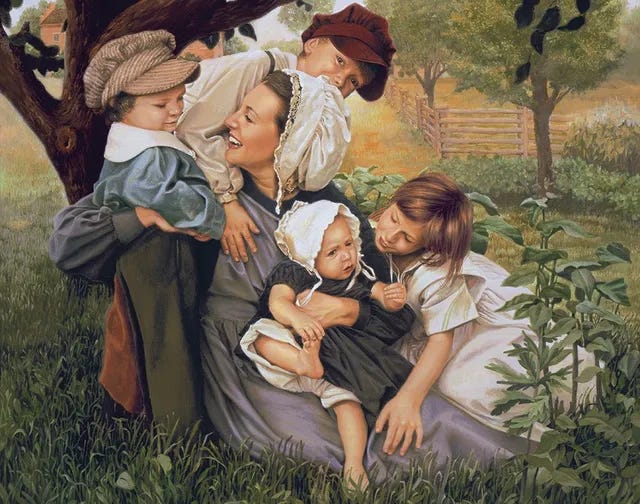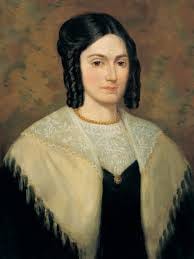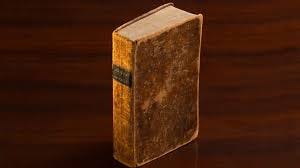I’m grateful that one of my readers reminded me to study Emma Smith’s patriarchal blessing. This blessing was given by Joseph Smith, Sr., the Prophet’s father and the patriarch of the Church:
“Emma, my daughter-in-law, thou art blessed of the Lord, for thy faithfulness and truth: thou shalt be blessed with thy husband, and rejoice in the glory which shall come upon him: Thy soul has been afflicted because of the wickedness of men in seeking the destruction of thy companion, and thy whole soul has been drawn out in prayer for his deliverance: rejoice, for the Lord thy God has heard thy supplication.
“Thou hast grieved for the hardness of the hearts of thy father’s house, and thou hast longed for their salvation. The Lord will have respect to thy cries, and by his judgments he will cause some of them to see their folly and repent of their sins; but it will be by affliction that they will be saved. Thou shall see many days; yea, the Lord will spare thee till thou art satisfied, for thou shalt see thy Redeemer. Thy heart shall rejoice in the great work of the Lord, and no one shall take thy rejoicing from thee.
“Thou shalt ever remember the great condescension of thy God in permitting thee to accompany my son when the angel delivered the record of the Nephites to his care. Thou hast seen much sorrow because the Lord has taken from thee three of thy children: in this thou are not to be blamed, for he knows thy pure desires to raise up a family, that the name of my son might be blessed. And now, behold, I say unto thee, that thus says the Lord, if thou wilt believe, thou shalt yet be blessed in this thing and thou shalt bring forth other children, to the joy and satisfaction of thy soul, and to the rejoicing of thy friends.
“Thou shalt be blessed with understanding, and have power to instruct thy sex. Teach thy family righteousness, and thy little ones the way of life, and the holy angels shall watch over thee: and thou shalt be saved in the kingdom of God; even so. Amen.”
This is a remarkable blessing.
The Smith and Sjodahl commentary on D&C 25 is fascinating, though in some ways antiquated:
Emma Smith, the wife of the Prophet, was not always free from doubts regarding the wonderful story of the coming forth of the Book of Mormon. From the fourth verse it is evident that she had murmered because she had not been privileged to see the plates. As the wife of the Prophet she seemed to feel that she was entitled to be admitted into the secret councils of her husband and his brethren.
Sons and daughters in my kingdom] All Men and Women are the offscpring of God (Acts 17:28-29) and they will become sons and daughters of God through obedience to all ordinances and covenants of the Gospel. (Rom. 8:14-17. D&C. 76:53-58.)
An inheritance in Zion] Emma was highly favored, but she could not obtain an inheritance in Zion on any other condition than faithful observance of the laws of God and “walking in the paths of virtue.” These paths are often narrow and steep, and “walking” - slowly and warily - is the only mode of progress possible.
An elect lady] The Prophet Joseph, when organizing the Relief Society, at Nauvoo, March 17th, 1842, explained that an “elect lady” is one who is elected to do a certain work in the Church, and that this Revelation was fulfilled when Emma was elected president of that organization. Her calling was, therefore, one of the greatest importance. Not only did she become the head of a benevolent society, but a pioneer in the great work of the emancipation of women - a movement which has grown like an avalanche. The women generally do not yet realize how much they owe to the organization of which Emma Smith was the first president - the first “elect lady.”
Murmur not] Emma had no just reason for dissatisfaction, although she had not seen the Book of Mormon plates; they had been hidden for a wise purpose which would be revealed in due time.
-12. Some of the duties of Emma Smith are here enumerated. And, first of all, she was to be a comfort to her husband. Her public duties were to come next.
5. A comfort to my servant] this comes first, A woman’s first and highest calling is to be the guiding spirit of the home, under her husband, who is the head of the household. The home is a divine institution. The Church depends on it. If the home is not a sanctuary where God is present, the church will be cold and cheerless. But the home depends, largely, on the wife and mother. Therefore, her first duty is to the home. Emma was also privileged to act as scribe, or amanuensis, to Joseph for a brief period.
7. Expound Scriptures and exhort] This Revelation was given at a time when women were not admitted to the higher institutes of learning, much less to the pulpits as exhorters. Emma was set apart to this calling. She was also called to compile a hymn book for the use of the Church (v. 11).
10. The song of the heart] God delights in the song of the heart; not in the mere sounds of the lips. Singing from the heart is worship; wherefore Paul says, “I will sing with the spirit, and I will sing with the understanding also” (I. Cor. 14:15). In such singing God takes delight. No music is as sweet as religious compositions; none is so majestic, so inspiring. Martial music stirs up the animal in man. So-called “ragtime” breeds frivolity, and appeals to the vulgar. Set to sacred text, it may produce a sensation of distressing incongruity. “Jazz” is an abomination, an evidence of recrudescence of savagery.
13-16. These exhortations are not given to Emma Smith only. “This is my voice to all.”
General Notes
Emma Smith did not accompany the Saints in their exodus from Nauvoo. At that time, the Nauvoo House, which the Saints, obeying a divine command (Doc. and Cov. 124:22-24, 60-64), had begun to build, became her property, the Prophet Joseph having been a large stock holder. She also retained some other property, including the “old homestead” and a small farm. The Nauvoo House subsequently passed into the hands of her second husband, Mr. Bidamon, who was not a member of the Church. He put part of the building under roof and fitted it up for a hotel.
In the year 1860 Elder Joseph F. Smith visited Nauvoo. He relates: “In the large dining room, which I had last entered in my childhood to witness the slain bodies of the two martyrs, some sixteen years before, we found Aunt Emma sitting, tailor like, on the large side-table. I knew her instantly. She was sewing. Frederick remarked. ‘Mother, do you know these young men?” She instantly raised her eyes, lifted her glasses on to her forehead, and, looking at me, said ‘Why, as I live, it is Joseph! Why, Joseph, I would have known you in-; you look so much like your father.’ These were her exact words. They fell with bewildering surprise upon my ears, and I shall never forget them” (Hist. Rec. p. 190)
If “ragtime” music breeds frivolity, and appeals to the vulgar, and if "jazz” is an abomination and an evidence of recrudescence of savagery, I wonder how Smith and Sjodahl would have described classic rock, grunge, or rap. 😂
We have so much more to learn about this great woman, Emma Smith, but I’m grateful for what I have learned about her thus far (see also here and here). There is so much more to savor in D&C 25 as well, but this week we are studying D&C 27-28. Before we dive into these sections, I would like to make a brief note on the final section that we studied last week, D&C 26.
D&C 26 is a revelation that the Lord gave to Joseph Smith the Prophet, Oliver Cowdery, and John Whitmer in Harmony, Pennsylvania, in July of 1830. (see also the heading to section 24). Lyndon W. Cook’s historical note in his book The Revelations of the Prophet Joseph Smith on this section is helpful:
During the month of July 1830, Joseph Smith began to arrange and copy the revelations that he had received thus far. This he did with the sassistance of John Whitmer, who was residing with Joseph and Emma in Harmony. Reference is made in section 26 to the “next conference,” which was held 26 September 1830 in Fayette, New York.
Publication Note. Section 26 was first published as chapter 27 in the Book of Commandments in 1833. (pp. 37-38)
Backman and Cowan’s book Joseph Smith and the Doctrine and Covenants provides more details on the background of this section:
Newel Knight described the setting of Doctrine and Covenants 26, another far-reaching revelation given August 1830: “In the beginning of August I, in the company with my wife, went to make a visit to Brother Joseph Smith, Jun., who then resided at Harmony, Penn. We found him and his wife well, and in good spirits. We had a happy meeting. It truly gave me joy to again behold his face. As neither Emma, the wife of Joseph Smith, nor my wife had been confirmed, we concluded to attend to that holy ordinance at this time, and also to partake of the sacrament, before we should leave for home. In order to prepare for this, Brother Joseph set out to procure some wine for the occasion, but he had. gone only a short distance, when he was met by a heavenly messenger, and received [a] revelation [see D&C 27]…” (p. 33)
In what is now D&C 26, Joseph, Oliver, and John were instructed by the Lord to study the scriptures and to preach the Gospel, and the law of common consent was affirmed:
Behold, I say unto you that you shall let your time be devoted to the studying of the scriptures, and to preaching, and to confirming the church at Colesville, and to performing your labors on the land, such as is required, until after you shall go to the west to hold the next conference; and then it shall be made known what you shall do.
And all things shall be done by common consent in the church, by much prayer and faith, for all things you shall receive by faith. Amen. (D&C 26:1-2)
If the Lord commanded young Joseph, Oliver, and John to devote their time to the studying of the scriptures, how much more so ought modern members of the Church to do the same? In my opinion, much of the confusion in the world and in the Church is the natural outgrowth of rampant and widespread scriptural and doctrinal ignorance. Joseph Smith had seen God the Father and Jesus Christ, and numerous angels. Oliver Cowdery had seen angels and the plates. John Whitmer was also a witness of the plates. Even after such miraculous manifestations, the Lord commanded these three men, Joseph, Oliver, and John, to devote their time to the studying of the scriptures.
The Lord also commanded them to devote their time to preaching and confirming the Church, and to performing their labors on the land until the next conference, whereupon more instructions would be given. But what does it mean for all things to be done by common consent in the church, by much prayer and faith?
The entry on Common Consent in Hoyt W. Brewster, Jr.’s Doctrine & Covenants Encyclopedia is helpful:
The form of government used in the Church is based on the principle of “common consent” (D&C 26:2; 20:65). This has been explained as follows: “Every officer of the Priesthood or auxiliary organizations, though properly nominated, holds his position in the Church only with the consent of the people. Officers may be nominated by the Presidency of the Church, but unless the people accept them as officials, they cannot exercise the authority of the offices to which they have been called. All things in the Church must be done by common consent. This makes the people, men and women, under God, the rulers of the Church.” (Priesthood and Church Government, John A. Widtsoe, 238-39) Elder Charles W. Penrose noted, “It is the voice of the Lord and the voice of the people together in this church that sanctions all things therein” (JD 21:45)
President Harold B. Lee identified this form of government as a “theocracy” (SHP, 150-52). This principle has been summarized by Smith and Sjodahl as follows: “In the Church of Christ where the government is that of the Kingdom of Heaven, neither autocracy nor democracy obtains, but government by common consent. That is to say, the initiative in all that pertains to the government of the Church rests with the Head of the Church, even our Lord Jesus Christ, and He exercises this sovereign function through his authorized servants, upon whom He has bestowed the Holy Priesthood: but it is the privilege of the people to accept, or reject, His laws and ordinances, for God has given every individual free agency. Obedience must voluntary.” (SS, 131.)
The LDS Church History Topics essay on Common Consent is also helpful and insightful.
In modern times we raise our hands to show that we sustain and support a person who receives a calling or a priesthood ordination in the Church. This is one way that the principle of common consent has been perpetuated in the Church. However, it seems to me that in the period of the early Restoration, the voting and sustaining process in harmony with the principle of common consent sometimes included much more discussion and debate. Nowadays it is unheard of, or at least very rare, to witness any members who raise their hands with a dissenting vote.
This is the rest of the Smith and Sjodahl commentary on D&C 26:
Go to the west] Refers to the second conference of the Church, at Fayette, Sept. 26th, 1830 (History of the Church, Vol. 1. p. 110.)
Common consent] There are two forms of government. The one-man form does not recognize the right of the governed to a voice in the government. This is called autocracy, and is frequently referred to as “paternalism.” government by the “people” means the rule of the majority, no matter by what means or methods that majority has been obtained. This is democracy. All human forms of government belong to one of these; they are either autocracies or democracies, or modifications of them. Both have merits, and also defects. In autocracies there is a tendency to disregard individual rights for the benefit of the few; in democracies the danger is that the worst element may obtain preponderance, because citizens of that class will employ means to gain their ends, which citizens with a high moral standard would never adopt. Democracies with party rule sometimes are exposed to all the evils of mob rule.
In the Church of Christ where the government is that of the Kingdom of Heaven, neither autocracy nor democracy obtains, but government by Common Consent. That is to say, the initiative in all that pertains to the government of the Church rests with the Head of the Church, even our Lord Jesus Christ, and He exercises this sovereign function through his authorized servants, upon whom He has bestowed the Holy Priesthood: but it is the privilege of the people to accept, or reject., His laws and ordinances, for God has given every individual free agency. Obedience must be voluntary. The government of the Church has been called a Theo-democracy. It is the form of government that will be general during the Millennium.
General Notes
The Prophet Joseph was a loyal patriot. He firmly held that the United States Constitution was an inspired document, but he never was an enthusiastic party politician. On January 23rd, 1843, he wrote to a newspaper editor:
“I have of late had repeated solicitations to have something to do in relation to the political farce about dividing the County; but as my feelings revolt at the idea of having anything to do with politics, I have declined, in every instance, having anything to do on the subject. I think it would be well for politicians to regulate their own affairs. I wish to be let alone, that I may attend strictly to the spiritual welfare of the Church” (History of the Church, Vol. V., p. 259).
On Dec. 20th, 1841, he wrote to the Time and Seasons:
“In the next canvass, we shall be influenced by no party consideration, and no Carthagenian coalescence or collusion with out people will be suffered to affect, or operate against General Bennett, or any other of our tried friends, already semi-officially in the field; so the partisans in this country, who expect to divide the friends of humanity and equal rights will find themselves mistaken - we care not a fig for Whig or Democrat; they are both alike unto us, but we shall go for our friends, our tried friends, and the cause of human liberty, which is the cause of God” (History of the Church, Vol. IV., p. 480).
Prayer and faith. These are the two mighty forces in the government of the Church.
“Boast not your lightning wires to bear the news, Such tardy means the Saint would never choose; Too slow your fluid, and to short the wires For heavnely converse, such as love inspires. If man would fain commune with worlds above, Angels transport the news on wings of love.” - Parley P. Pratt
The government of the Kingdom of God embodies the best features of human governments, and avoids the defects. In that Kingdom the inspired representatives of the Lord teach the people correct principles; that ends their responsibility in the matter. Every individual must then accept, for himself, the responsibility for the course he pursues, be it one of obedience or disobedience. Even the Decalogue was submitted to the people under the law of Common Consent (Ex. 19:1-8.). President Brigham Young says:
“Who called Joseph Smith to be a Prophet? Did the people or God? God, and not the people, called him. Had the people gathered together and appointed one of their number to be a prophet, he would have been accountable to the people; but inasmuch as he was called by God, and not the people, he is accountable to God only and the angel who committed the gospel to him, and not to any man on Earth. The Twelve are accountable to the Prophet, and not to the Church, for the course they pursue” (History of the Church, Vol. V., p. 521).
This is an accord with the doctrine of Common Consent. The Prophet is responsible to God, and the Twelve are accountable to the Prophet for the manner in which they perform the duties of their offices, but as members or officers of the Church, they are also subject to the laws and rules of the Church, as much so as any member or officer. Compare Doctrine and Covenants, Sec. 107:81-84. (pp. 131-133)
Entire books could be and have been written on the topic of politics and the Church. A very interesting book could be written, for example, on the politics of the Book of Mormon. But let this suffice for now for an introduction to the topic of Church government, and a conclusion to our study of D&C 23-26.








